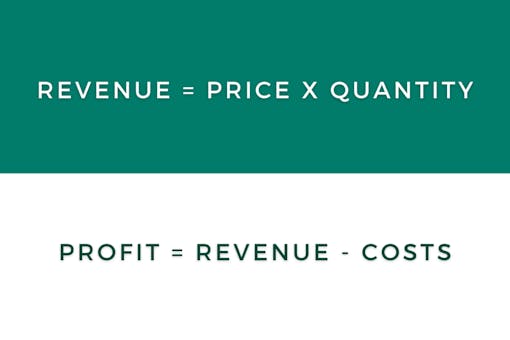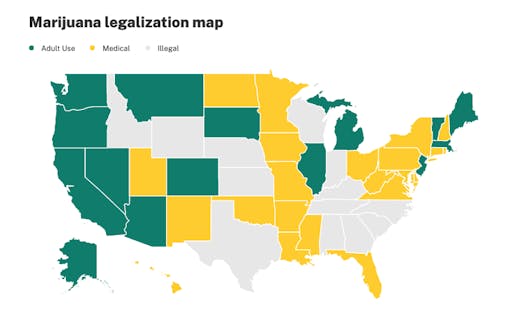This article is the first in a series called, “So you want to start a canna biz?” created in partnership with Good Tree Capital. The first topic we’ll cover is how to start a cannabis business, including tips on location, cost, and long-term success in cannabis.
1. How do I pick the right community for my cannabis business?

While it may seem like state legalization is a green light for cannabis businesses to open up on every corner, it’s not quite that simple. Every city, town, and municipality in the country has its own unique set of policies. Take California for example.
While you probably know the state as the weed capital of the country, less than a third of California cities (144 of 482) allow medical-use cannabis business in their borders, and an even smaller number of counties permit adult-use cannabis businesses. As another example, Michigan’s Prop 1 made it legal for 792 towns and cities to sell cannabis, but 39% of those cities used hyper-local measures (city legislation) to block cannabis businesses.
Examples such as these underscore the importance of thoroughly researching the state law and local laws of a community before selecting one for your cannabis business. Understanding the policy ecosystem is critical to how you will conduct operations, apply for a license, and of course, where you open your business.
Beyond policy, it is also critical to engage with the people who make up the community and assess whether there is a gap in the market that your business can fill. The real opportunity lies in both physical location and local enthusiasm.
2. Which cannabis business model is right for me?
When people think of the cannabis industry, more often than not, their minds immediately jump to dispensaries. However, a cannabis dispensary is just one of the many types of businesses that operate within the industry.
It is essential to critically evaluate your own business experience and use that knowledge to inform which business model you decide to pursue. For example, suppose you have a strong background in supply chain. In that case, you can translate that knowledge into a successful delivery service, or if you have experience in agriculture, perhaps your skills are best fit to cultivate the plant as a grower.
People often fail to realize that new opportunities and room for innovation are abundant amongst ancillary businesses, such as packaging, real estate, and even professional services like insurance or litigation.
However, it is a safe bet to say that those who will be most successful in the industry will be the creative entrepreneurs as opposed to those simply going after existing, licensed business models.
This emerging space is ripe with opportunity. To position yourself for success, it is imperative that you intimately understand every aspect of your business, play to your strengths, and carve out a niche for yourself that can grow with the industry.
3. How do I get a cannabis license?
There are many opportunities for those who want to enter the cannabis industry, but it’s not possible to simply set up shop and open your doors. First, you must get a license to operate a cannabis business, and that isn’t an easy or inexpensive thing to do.
There are different cannabis licenses depending on the type of cannabis business you are trying to open, including different options for:
- Retail dispensaries
- Delivery services
- Cultivation (indoor and outdoor)
- Manufacturing (e.g., oral and edible products)
- Distribution
- Transportation
- Cannabis testing facilities
Licensing laws vary from state to state, and you need to understand them thoroughly if you want to be successful. For example, in Massachusetts, you must get local approval to do business in your selected municipality before you can be granted a state license.
The cannabis license application process is a complicated one that often requires the help of experts. It can take many months and tens of thousands of dollars to complete.
Keep in mind that some states have multiple applications and that each state’s application process (including specific scoring criteria on the application) will vary. Businesses with a strong business plan, funding, real estate, and a well-written license application will have the best chance to secure a license and join the cannabis industry.
4. How do I build out my team?

As a leader, it is crucial to establish the vision you have for your company and define the goals supporting that vision. Once you do this, you can then begin to work backward to build your team.
First, you must ask the following: How do I add value, and where can I contribute my skills the best? From there, you can identify critical gaps and determine which roles you need to fill—hiring people to do what you can not.
It’s important to note that not all roles require the same hiring urgency. For example, you may need to find an expert to support operations immediately, while you may not need to hire a social media professional for another six months. Asking yourself these kinds of questions will help you hire the right talent at the right time.
You will also want to have an eye towards growth and expansion when hiring. This means hiring candidates who are qualified for the work at hand and hiring candidates who can grow in their roles as the company grows.
The most successful companies aren’t run by one ultimate leader. They are operated by a team of leaders that work together well, execute defined goals, and contribute in ways that optimize for impact and maximize for success.
5. How do I define a target market in cannabis?
You can’t have any type of business without customers. But acquiring customers isn’t as simple as it sounds.
First, you have to learn everything you can about who those customers are to give them what they want. And once you have captured them, you have to retain them. Loyal customers are as important as new ones to your business’s success.
Because the cannabis industry is still emerging, as well as being federally illegal, this process can be more difficult for cannabis businesses than it is for companies in other sectors.
Insights and research about these customers are not readily available—which means that a cannabis company might have to use a grassroots approach when learning about them. In other words, you might need to personally interview potential customers before you start your business, as well as regularly solicit feedback from them as your business grows.
In these ways, you are always meeting the needs of your current customers while at the same time planning ahead to meet the needs of future ones.
6. What do I need to get my cannabis business started?
It is hard to overstate the importance of writing a business plan, an imperative first step to starting your business. You must ask and answer some fundamental questions such as:
- What problem does your product or service solve?
- Is my business unique or are there substitutes?
- How many customers will pay to use my product or service? At what price?
- What does it cost to produce the product or service?
The primary benefit of developing a business plan is that it forces you to think through the business model’s details and whether it will eventually earn a profit.
Realistically understanding the path to profitability is the key. Otherwise, you’ll have a hard time finding someone to provide you with seed capital to get things off the ground.
One major cautionary note to aspiring cannabis licensees: remember that you are selling a commodity in a highly-regulated and highly-taxed industry. Ensure you understand all of those considerations before funneling tens of thousands of dollars into preparing and submitting an application for licensure.
7. Do I have all the financial resources I need to start my cannabis business?

Financing a business happens in one of three ways:
1) Profit from sales
2) equity investments
3) taking out debt
To earn a profit, the revenue you generate from selling a product or service must exceed the combined costs of providing the product or service. It often takes brand new businesses months, sometimes years, before they reach profitability. For that reason, the most realistic financing options for aspiring licensees are equity and debt.
Equity is the cash that owners invest in the business. Entrepreneurs often turn to family, friends, and close associates to give them seed capital in exchange for a percentage ownership.
Alternatively, business partners may contribute cash to cover expenses. In all cases, this cash is not expected to be repaid, per se. Instead, equity owners generate returns by building a business that eventually makes a profit. That profit is either reinvested in the business or divided among the owners.
Debt is cash borrowed that must be repaid. Unless you’re a hell of a negotiator who can get a lender to forgo repayment until your business generates enough money, debt is probably not the best route for early-stage companies. Preserving cash for operating expenses is the advisable approach.
8. How do I guarantee my cannabis business’s success?

This basic arithmetic lies at the heart of growing and sustaining a business over time. Once your business is up and running, the challenge becomes your ability to optimize price, quantity, and costs so that your business eventually generates profit for its owners. This is where knowing your customer, community, and the broader market for your product or service becomes very important.
Perhaps your dispensary is located in a working-class area with customers who value a good bargain. This sort of consumer market knowledge might lead you to compete on price, making your dispensary the #1 destination for finding the lowest-priced product on the market. But if your price is low, your quantity must grow. That is the only way to employ such a strategy and increase revenue at the same time.
Of course, increasing revenue is not the only consideration. Your fixed and variable costs (e.g., product costs, employees, rent, etc.) must be lower than the price you charge per unit x the number of units sold – otherwise known as revenue.
That means you will need to be uniquely savvy at negotiating lower product costs than any of your competitors. That’s how Walmart and Amazon deliver low prices. Cannabis is no exception.
9. How will future cannabis legalization measures impact my business?

The cannabis industry is growing and changing at a breakneck pace. As of November 2020, a total of 35 states and the District of Columbia have legalized cannabis for medical use, and 15 have allowed adult recreational use. Recent estimates state that American cannabis businesses could pump up to $130 billion annually into the U.S. economy by 2024. And despite the uncertainty caused by the coronavirus pandemic, all signs indicate that the short-term disruptions to the industry are not likely to impact its long-term economic trajectory.
That being said, it takes money to make money. Because cannabis is still classified as a Schedule 1 drug, most banks will not provide accounts to or lend to cannabis companies.
Besides the tremendous risks and inconvenience for companies forced to operate in cash, the status quo amplifies financial barriers to entry for entrepreneurs who do not have family, friends, and associates who can readily provide start-up capital.
Some progress has been made with the SAFE Banking Act, however, more work needs to be done.
We have sufficient evidence that tells us that minorities and women do not have equitable access to capital within the cannabis industry. It is therefore insufficient to simply grant banks the ability to service cannabis businesses.
Congress must, at the same time, proactively identify and support financial technology disrupters and de novo banks specifically focused on providing fair access to capital. A new generation of banks will be needed to solve this problem and promote diverse ownership of cannabis licenses nationwide.
10. Where do I go for more information about starting and sustaining my cannabis business?
The cannabis industry changes daily, and so does the information. As part of “So you want to start a canna biz,” we’re kicking off an eight-week educational email series in May. Sign up here to get our emails when they start rolling out!
Here are some additional resources to help you start your journey to a successful cannabis business.
Cannabis industry growth potential






